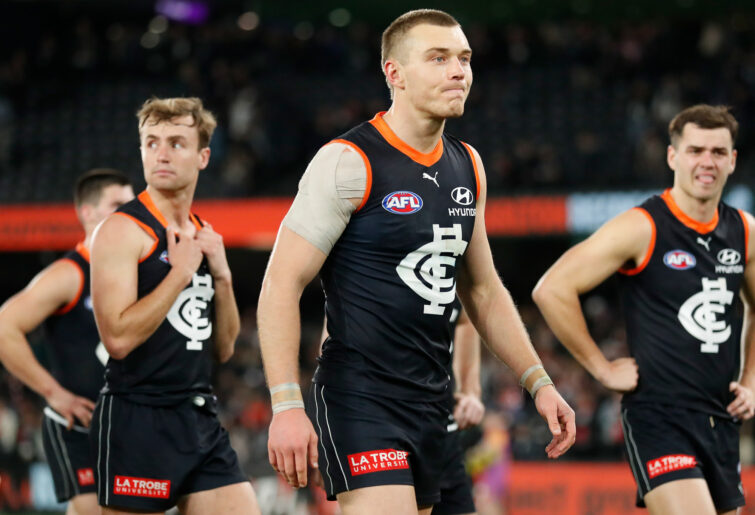
Carlton had all rights to appeal the decision, particularly considering the challenge it would have faced over the final two weeks of the season should the team have been forced to compete without its star midfielder.
The Blues’ appeal of the original two-week suspension proved successful, leaving many scratching their heads, and the tragedy that subsequently played out for Carlton across the final fortnight of home-and-away play potentially served as some sort of poetic justice, as the Demons and Pies ended what had at one stage had looked like a promising season.
The ruling was just the latest in a series that effectively softens what should and was supposed to be a firm and consistent approach to contact with the head, especially in incidents where damage is done.
Players leaving the ground, turning into contact and removing the focus of the ball from their eye line were all intended to be measuring sticks when it came to cracking down on incidents the game had tolerated for too long. Cripps did all three, was second to the ball without making any physical adjustments and laid out a helpless opponent who did nothing but remain focussed on the ball.
Ah Chee was the victim, Cripps was the aggressor, and despite the Carlton midfielder’s reputation for playing the game in exactly the right manner – hard, tough and uncompromising – the AFL erred in not allocating responsibility to him for the act.
In short, accidents or unintentional behaviours are still subject to punishment by the tribunal. Cripps may well have had no intention to iron out Ah Chee in the manner he did, but he did, and thus he was irresponsible, reckless and required to serve time for an act that could have long-term repercussions for the victim.

(Photo by Michael Willson/AFL Photos via Getty Images)
While the governing body appears to have a long way to go when it comes to committing completely to protecting the heads of modern players and understanding the potential legal ramifications of not doing so, recent events in club land seem to suggest that the actual grey matter inside the skull itself is still of little importance to at least two AFL clubs.
As the once great Essendon Football Club spirals into utter disarray after a disastrous season, a backfiring succession play and a last-minute, desperate and embarrassing attempt to snare the signature of Alastair Clarkson meant sacked coach Ben Rutten had his life, emotions and reputation shredded by a thoughtless and cruel Essendon board.
The manner in which Rutten was treated during the week while he continued to fulfil his duties as coach – while the club openly courted another to replace him – was utterly appalling. A dignified departure the week earlier would have been a far more appropriate way to sever ties with a coach that has suffered immensely from a group of players whose inconsistency says perhaps more about them than him.
In terms of mental health, it was abusive and cruel, and seeing Rutten in tears in the rooms after the Round 23 loss reflected the inhumane situation in which he had been placed.
The Bombers board should simply be ashamed.
Similarly, the Brisbane Lions administration also showed utter disregard for the mental health of the young men involved in the game after captain and club legend Dayne Zorko levelled the most distasteful and despicable verbal attack on Melbourne’s Harrison Petty during the Demons’ 58-point win on Friday night in Brisbane.
At the time of writing, the club is yet to stand Zorko down from the captaincy or finals play after one of the most disgusting incidents in recent history. The AFL has also remained silent, with no sanction emanating from the body which holds ultimate jurisdiction over the game as a whole.
The Lions’ official statement, which referred to the Zorko incident as “not ideal” and expressed a desire to make sure Zorko was “okay from a mental health perspective”, is an utter insult to Petty, the Demons and the entire AFL community.
For all the great work done in the Indigenous space, the connections made with meaningful charities and the continued focus on inclusion and diversity, the game stands at risk of being seen as somewhat tokenistic should the desire to protect the head and the mental health and wellbeing of its players continue to appear as an afterthought.

Leave a Reply